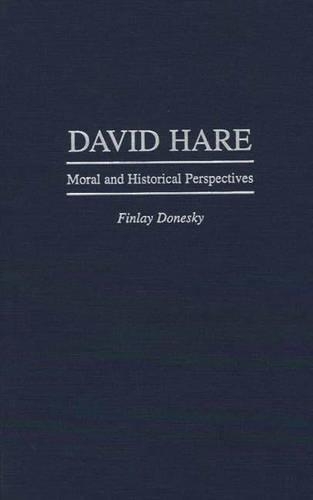
David Hare: Moral and Historical Perspectives
(Hardback)
Publishing Details
David Hare: Moral and Historical Perspectives
By (Author) Finlay Donesky
Bloomsbury Publishing PLC
Praeger Publishers Inc
25th November 1996
United States
Classifications
Tertiary Education
Non Fiction
Literary studies: c 1900 to c 2000
Plays, playscripts, drama
822.914
Physical Properties
Hardback
232
Description
In the last 30 years, David Hare has written 12 stage plays, seven screenplays and one opera, and has gained international attention as one of Britain's major contemporary playwrights. Hare's prominence springs not only from the sheer volume of his work, but from his long career of chronicling the social and political fragmentation in postwar Britain. This is the first work to demystify the implications of Hare's presentation of the moral and political health of the British nation. Arguing that one needs to have a deeply informed sense of English and British identity and postwar British society in order to understand Hare's work, Donesky thoroughly contextualizes and historicizes Hare's work. This study demonstrates how Hare's seemingly enigmatic moral vision is actually characteristic of the attitudes of Britain's governing classes.
Reviews
Like John Osborne a generation earlier, Hare is a significant British playwright who rails passionately against a stultifying social situation he also defends....Donesky places the plays in the social context of England with remarkable thoroughness and shows how Hare's characters move from identification with a moral consensus experienced duting WW II, to a more personal concern with 'soul' during the ascendancy of Prime Minister Thatcher, to a role in preserving the key British institutions of church, law, and government....The writing dealing with Hare and his time is exemplary...Donesky has produced a first-rate critical examination of an important playwright.-Choice
"Like John Osborne a generation earlier, Hare is a significant British playwright who rails passionately against a stultifying social situation he also defends....Donesky places the plays in the social context of England with remarkable thoroughness and shows how Hare's characters move from identification with a moral consensus experienced duting WW II, to a more personal concern with 'soul' during the ascendancy of Prime Minister Thatcher, to a role in preserving the key British institutions of church, law, and government....The writing dealing with Hare and his time is exemplary...Donesky has produced a first-rate critical examination of an important playwright."-Choice
Author Bio
FINLAY DONESKY is Assistant Professor of English at the University of Kentucky. He has published articles on contemporary British and American drama.
